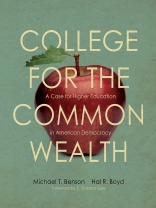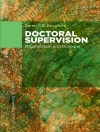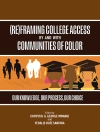In the past decade, states across the nation have cut higher education spending per student by more than 15 percent. Kentucky has experienced some of the largest cuts in the country, leading many to claim that higher education is in a state of crisis. In spite of this turmoil, however, Kentucky’s remarkable institutions of higher education stand more capable than ever to prepare new generations for the challenges and opportunities of their time.
College for the Commonwealth: A Case for Higher Education in American Democracy illustrates how colleges and universities are the sustaining lifeblood of civil society and that when these vital institutions are underfunded, both the community and economy suffer. Michael T. Benson and Hal R. Boyd examine the historical origins of higher education in America and analyze the benefits of postsecondary education through the lens of Kentucky. Presented as a practical yet persuasive look at why America needs thoughtful reinvestment in its colleges and universities, this study details how helping students can help sustain a healthy, democratic social fabric while bolstering the modern economy. Gathering examples and offering solutions for postsecondary institutions, this work serves as a call to action and a roadmap for educators, administrators, and government officials.
Inhaltsverzeichnis
Foreword
Introduction: Making the Case for Reinvestment
1. The Democratic Ethos of Higher Education
2. ‚Univercities‘ and the Soul of the Student-Citizen
3. Higher Education and the Fourth Estate
4. Universities as America’s Ambassadors-at-Large
5. A Liberal Education as Part of a Publicly Minded Education
6. Dynamic Challenges and Solutions in Higher Education
7. Higher Education at Work for the Commonwealth
Conclusion: Commonwealth at the Crossroads
Acknowledgments
Notes
Index
Über den Autor
Hal R. Boyd has written for various journalistic and scholarly venues, including the Atlantic, the National Review, the Weekly Standard, and The Oxford Handbook series. Boyd holds a juris doctor from Yale Law School and teaches part–time at Brigham Young University.











